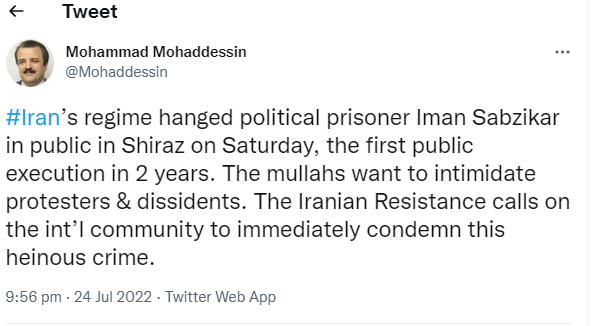Iran: First public hanging in two years amid growing wave of executions
- iranpolitprisoners
- Sep 7, 2022
- 3 min read

On Saturday, July 23, Iranian authorities hanged political prisoner Iman Sabzikar in public in Shiraz. This is the first public hanging in two years.
Shiraz’s rebellious youths had countered the security forces last February when they maliciously harassed two youths at the Bid-Zard police station. During those clashes with the State Security Force (SSF), IRGC Colonel Ali Akbar Ranjbar, the deputy chief of the SSF station who had attacked the people, was killed.
Sabzikar, a worker from Juneqan, was arrested, brutally tortured and sentenced to death under the regime’s “Qisas” law. The chief prosecutor in Fars province described Sabzikar’s execution as such: “Dealing quickly with the case was placed on the agenda, and a preliminary verdict was issued based on retributive laws.” Quoting the chief prosecutor, the IRGC affiliated Fars News Agency wrote, “After preparation for execution of the verdict, he was executed at the place of the incident at 5:40 am.”
The Iranian Resistance called on the international community to condemn the brutal hanging of Sabzikar and hold the regime to account for its inhuman behavior. “This regime’s crimes, a disgrace to contemporary human society, should be referred to the United Nations Security Council, and its leaders brought to justice for four decades of crimes against humanity and genocide,” the National Council of Resistance of Iran (NCRI) said in a statement.
Sabzikar’s brutal execution marks the continuation of the escalation of executions by the Iranian regime. On the same day that Sabzikar was executed, ten other prisoners were hanged in different cities, including seven in Zabol and Zahedan, and three in Langerud, Qom province.
On July 21, the regime executed two prisoners in Birjand and another prisoner in Yazd. Two more executions took place on July 20, one in Qom and another in Isfahan.
In May, Amnesty International warned that Iran has seen the highest number of executions in 2021, since Ebrahim Raisi became the regime’s president.
“Iran accounted for the biggest portion of this rise, executing at least 314 people (up from at least 246 in 2020), its highest execution total since 2017. This was due in part to a marked increase in drug-related executions—a flagrant violation of international law which prohibits the use of the death penalty for crimes other than those involving intentional killing,” according to the Amnesty International report. The actual number of executions are most likely higher.
Iran’s regime is faced with a growingly restive society, with protests erupting in every corner of the country on a regular basis. Iran is faced with an economic crisis, caused by the regime’s corruption, mismanagement, and refusal to back down from its destructive policies, including nuclear bombs, ballistic missiles, and terrorism.
While many protests are triggered by economic woes, they quickly turn into full anti-regime demonstrations that call for regime change. In the past months, Iran has seen several rounds of intense protests, in which protesters clashed with security forces and refused to back down in face of the regime’s repressive forces.
Under such circumstances, instead of responding to the people’s just demands, the regime has doubled down on crackdown and repression. The new wave of executions comes at the same time as it is taking other repressive measures in schools, universities, and public offices. The regime aims to establish a climate of fear and intimidation throughout the Iranian society.
This is why we are witnessing even more oppression and executions parallel to the country’s economy crumbling and more people being pushed into poverty.
The history of dictatorial regimes, however, has shown that heavy crackdowns and executions will prove counterproductive. There comes a time that such measures will not only fail to lessen the dictator’s concerns but in fact further fuel the fire of social outcries. This is the dangerous phase that the mullahs’ regime currently faces.





Comments